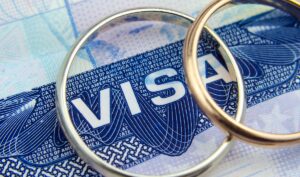
When filing immigration applications and petitions, the U.S. government often requires you to submit supporting documentation for marriage status, familial relationships, nationality and name changes. You may also need to document past interactions with police or the court system. It’s important to be truthful and transparent. The government typically does a criminal background check as a part of the green card application and other immigration benefits. Therefore, you will need to gather these civil records which are relevant to your situation.
This article provides guidance to help you find these important documents through public records or other searches. Sometimes criminal and civil records are simply not available. We’ll explain how to proceed in these situations and provide alternative evidence.
Not sure which civil records you need for your application or petition? CitizenPath's online immigration services make it simple to prepare your forms and gather the correct supporting documents. In addition to your prepared form, CitizenPath provides you with a set of personalized filing instructions. Our filing instructions are customized to your answers in the application so you know what to do for your specific situation. You'll know exactly which supporting documents -- birth certificates, marriage certificates, divorce decrees, death certificates, and other -- to include.
Types of Civil, Vital, and Criminal Records for Immigration
Civil records are documentation of life events created by an official government agency or officer. They may also include records that are filed with a government agency or office. In the United States and some other countries, civil records are typically public records. That’s because most public records are available to anyone that requests them. There are some limitations to protect confidentiality.
Many countries outside the United States may use a family register, household register or family album. They are all different names for a civil registry used to track information of a genealogical or family-centric legal interest. Of course, each country may have unique names for these family registers. Names include hojeok in South Korea, koseki in Japan, familienbuch in Germany, hukou in China, and (formerly) propiska in the Soviet Union.
Vital Records (Birth, Death, Marriage and Divorce Records)
Vital records generally include documents like birth and marriage records. These records are commonly required as supporting documents to evidence relationships, marriage status and nationality. Examples of documents that the U.S. government may request include:
- Birth certificate
- Marriage certificate
- Divorce decree
- Certificate of annulment
- Death certificate
Criminal and Court Records
Again, many immigration applications and petitions require you to disclose and document past interactions with law enforcement, both in the United States and abroad. Examples of documents that the U.S. government may request include:
- Arrest report
- Official statement from arresting agency
- Court order with the disposition
- Probation or parole record
When applying for an immigrant visa at U.S. embassy or consulate abroad, the National Visa Center requires you to submit certified court and prison records for each conviction. Even if you received a pardon or were otherwise granted amnesty, you must submit records that include the complete circumstances of the crime for which you were convicted and the final outcome of the case, including the penalty. (Note: Police records are different than a police clearance certificate.)
Applicants inside the United States must submit police and court records to USCIS that include any arrest or charge, even if they occurred as a minor or were later expunged. Unless the incident involved alcohol, drugs, personal injury or property damage, you likely do not need to provide records related to minor traffic violations.
You may also be required to submit a statement related to events that led to your arrest and/or conviction. It’s always best to seek the advice of an immigration attorney when applying for immigration benefits after an arrest and/or conviction. An attorney can help you strategize for your particular situation and assist with your written statement.
Search for Civil Records in the United States
In the United States, the happenings of a courthouse are a matter of public record. Once a court closes the case, you may generally access these records. You may typically obtain criminal records through courthouse and police records databases. Additionally, the local county clerk's office where the event took place typically manages birth, death, marriage and divorce records.
If you’re trying to access records for an event inside the United States, you can typically access your court records directly from the court where your case was heard, and you can access civil documents from the county clerk or other local government. Start your search here.
States will also often have a department of health that can provide access to older civil records. It isn’t always necessary to visit the physical offices. Many states are establishing online databases for ease of access. To find the vital records offices in your U.S. state or territory, the Centers for Disease Control and Prevention hosts a directory.
In many cases, there is no fee to access public records when accessing them through the government agency that manages them. However, these agencies often charge a fee to make copies or provide other services.
Search for Civil Records Abroad
If you are seeking civil records for events that occurred abroad, you’ll need to search inside that country. Each country has different processes and procedures for obtaining civil records information. Not sure where to start? The U.S. Department of State hosts a helpful tool to begin your search.
Not all countries maintain the information required for immigration purposes. In many some, the records may not be available. It may be necessary to document why the records are not available and also provide alternative evidence.
Remember, you’ll need a translation of your documents when submitting them to submitting them to USCIS or NVC. If you have included any foreign language documents with your application or petition, you must also submit certified translations into English.
Alternative Evidence – When Civil Records are Unavailable
When your civil record is not available or does not exist, you must prove its unavailability or nonexistence and provide alternative evidence of the event (such as a birth, marriage, etc.). Follow these steps:
Check for Availability of the Document
As described in the section above, use the Department of State’s directory to determine if the civil record is available in your country. If this web page shows that birth certificates from your country of birth are generally unavailable or nonexistent, you do not need to do anything to prove that your birth certificate is unavailable or nonexistent. Skip to Step 3.
Get a Certificate of Non-availability
If the Department of State’s directory does not indicate that the civil record you are seeking is generally unavailable or nonexistent, you must submit a certificate of non-availability. These letters must be:
- An original written statement from a civil authority on official government letterhead;
- Establish the nonexistence or unavailability of the document;
- Indicate the reason the record does not exist; and
- Indicate whether similar records for the time and place are available.
You must submit the original Certificate of Non-availability document along with alternative evidence. Continue to Step 3.
Provide Alternative Evidence
When your civil record is not available or does not exist, you must submit other evidence that corroborates the facts you are stating on your immigration form. Alternative evidence may include affidavits or any other proof relating to the facts of the event.
- An original affidavit is a written explanation from a third party that describes the facts of the event. It may be written by a friend or family member who is close to you and generally was there to witness the event (birth, marriage, etc.). The general rule is to submit at least two affidavits. Reference a sample affidavit of birth.
- Any other document may be used if it evidences the event in some way. For a birth, religious or school records, hospital or medical records, or similar evidence may be appropriate. Some examples include but are not limited to a baptismal certificate, school registration with birth date, and census records.
If submitting only affidavits of birth (and no other alternative evidence), submit at least two affidavits of birth with Form I-485.
Original, Apostille, and Notarized Documents
Generally, you only need the photocopy of an original document or photocopy of a certified copy of the original. U.S. immigration does not require apostille. Unless specifically requested for a type of document, you typically do not need to acquire notarization.
In most cases you may submit photocopies of civil records and other documents when filing USCIS and other immigration forms. Refer to the official government instructions or your personalized CitizenPath filing instructions. We will also indicate when you must submit an original document. CitizenPath’s online immigration service can make the entire process affordable and simple.
Regardless, we recommend that you take the original document or certified copy to your interview. You may not need it. But if you don’t have an original or certified copy when the officer requests it, your case may take several more weeks to adjudicate.
Use the Right Civil Documents for your Case
CitizenPath's online immigration services make it simple to prepare your forms and gather the correct supporting documents. You'll receive a ready-to-sign application or petition, but you also get a checklist of supporting documents for your specific situation. You'll know exactly which supporting documents -- birth certificates, marriage certificates, divorce decrees, death certificates, and other -- to include.
CitizenPath provides simple, affordable, step-by-step guidance through USCIS immigration applications. Individuals, attorneys and non-profits use the service on desktop or mobile device to prepare immigration forms accurately, avoiding costly delays. We allow users to try the service for free and provides a 100% money-back guarantee that USCIS will approve the application or petition. We provide support for the Adjustment of Status Package (Form I-485), Immigrant Visa Petition Package (Form I-130), and several other immigration services.
Want more immigration tips and how-to information for your family?
Sign up for CitizenPath’s FREE immigration newsletter and
SAVE 10%
on our immigration services






